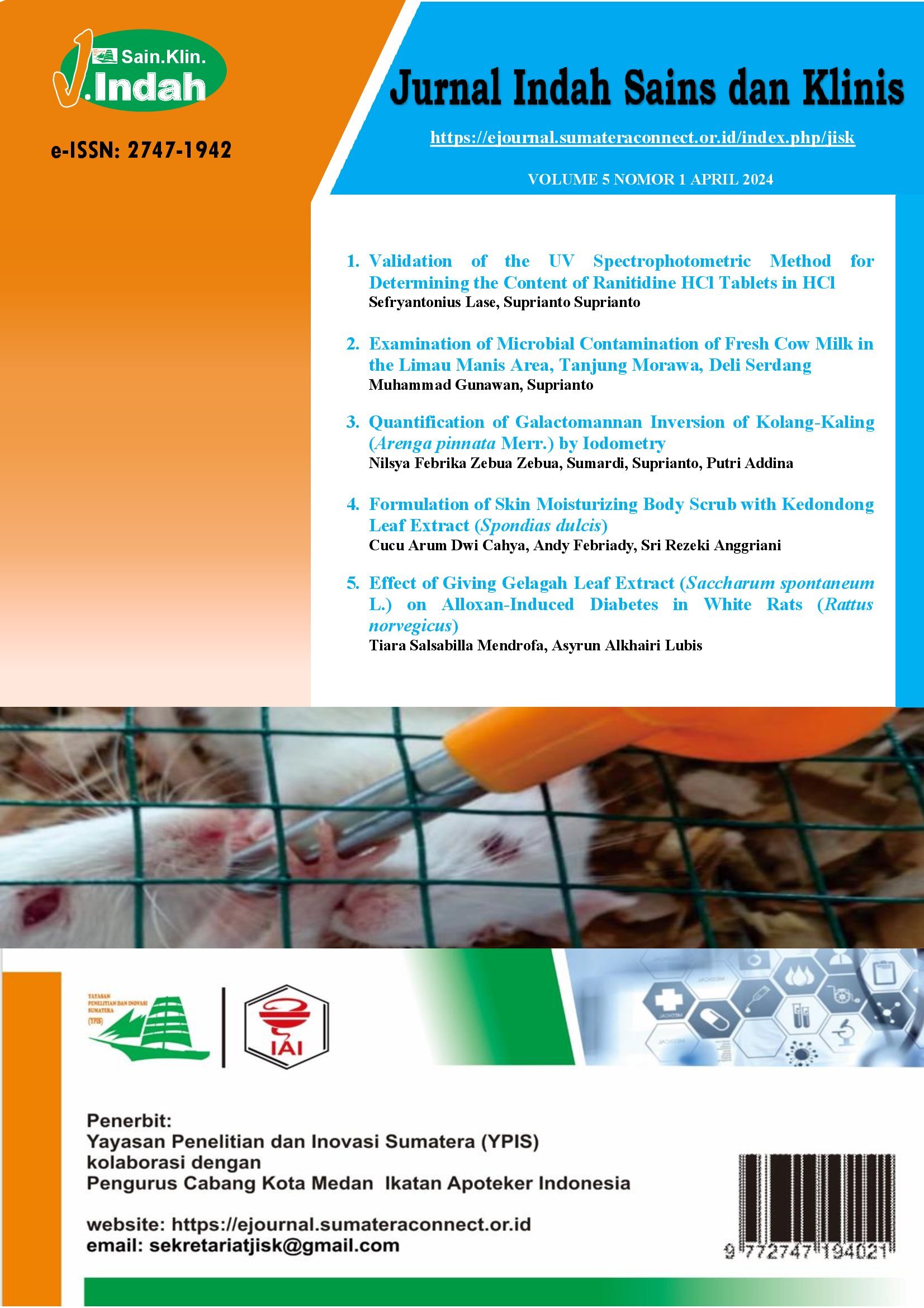Formulation of Skin Moisturizing Body Scrub with Kedondong Leaf Extract (Spondias dulcis)
DOI:
https://doi.org/10.52622/jisk.v5i1.04Keywords:
Kedondong leaves, preparation evaluation, ethanol extract, body scrubAbstract
Background: Body scrub is a skincare preparation that effectively removes dead skin cells caused by free radicals. Kedondong leaves are a plant with extraordinary wealth, especially its vitamins, namely A, B1, and C, and have a high antioxidant content, so they can be used as a natural moisturizer for the skin. Objective: This research aims to formulate a body scrub containing Kedondong leaf extract. Method: Kedondong leaf extract was formulated with a concentration of 10.0; 15.0; and 20.0%. Evaluation of the body scrub formulation includes organoleptic, homogeneity, pH, irritation and moisture using a skin analysis tool. Results: Research shows that the body scrub formulation with Kedondong leaf extract is homogeneous and has a shape, colour and pH value corresponding to skin pH standards. This formulation also does not irritate and provides adequate moisture for the skin. The formulation with a concentration of 20% (F4) shows the best effectiveness, being able to moisturize the skin up to 47.8%. Conclusion: Kedondong leaves can be formulated into an effective body scrub to improve the condition of dull skin to make it brighter, cleaner and smoother.
Downloads
References
G. Manessis, A. I. Kalogianni, T. Lazou, M. Moschovas, I. Bossis, and A. I. Gelasakis, “Plant-Derived Natural Antioxidants in Meat and Meat Products,” Antioxidants, vol. 9, no. 12, p. 1215, 2020. DOI: https://doi.org/10.3390/antiox9121215
V. N. Gladyshev, “The Free Radical Theory of Aging Is Dead. Long Live the Damage Theory,” Antioxid. Redox Signal., vol. 20, no. 4, pp. 727–731, 2014. DOI: https://doi.org/10.1089/ars.2013.5228
A. Chan, Afriadi, H. S. Winata, Suprianto, and Sahrita, “Formulasi Sheet Mask Ekstrak Etanol Kulit Pisang Ambon (Musa Paradisiaca L.) Sebagai Moisturizing,” J. Ilm. Manuntung, vol. 7, no. 1, pp. 73–78, 2021.
M. Sari, A. Chan, and V. Elvani, “Formulasi dan Stabilitas Body Scrub dari Ekstrak Etanol Kulit Manggis (Garcinia mangostana L.) sebagai Pelembab Kulit,” J. Ilm. Multidisiplin, vol. 2, no. 9, pp. 4314–4320, 2023.
L. Leny, I. Ginting, R. A. R. Hutabarat, S. Suprianto, and B. Iskandar, “Formulasi Krim Pelembab Kombinasi Ekstrak Lidah Buaya (Aloe vera) dan Ekstrak Kulit Manggis (Garcinia mangostana L.),” J. Islam. Pharm., vol. 7, no. 1, pp. 11–16, 2022. DOI: https://doi.org/10.18860/jip.v7i1.14093
F. Latifah and R. Iswari, Buku Pegangan Ilmu Pengetahuan Kosmetik. Jakarta: Gramedia Pustaka Utama, 2013.
D. Muliyawan, AZ tentang Kosmetik. Jakarta: Elex Media Komputindo, 2013.
D. Rahmawanty and D. I. Sari, Buku Ajar Teknologi Kosmetik. Purwokerto: IRDH, 2019.
S. Ningsi, F. Y. Nonci, and R. Sam, “Formulasi Sediaan Lulur Krim Ampas Kedelai Putih dan Ampas Kopi Arabika,” J. Farm. UIN Alauddin Makassar, vol. 3, no. 1, pp. 1–4, 2015.
I. Kristianingsih and S. Munawaroh, “Formulasi dan Uji Stabilitas Sediaan Body Scrub Kombinasi Ekstrak Bunga Rosela (Hibiscus sabdariffa. L) dan Pati Bengkoang (Pachyrhizus erosus L.) dengan Variasi Emulgator Asam Stearat,” JJournal Curr. Pharm. Sci., vol. 5, no. 1, pp. 447–453, 2021.
G. D. Y. Hadinata, “Optimasi Variasi Suhu dan Waktu Ekstraksi Ekstrak Daun Kedondong (Spondias dulcis) terhadap Aktivitas Antioksidan,” Universitas Atma Jaya Yogyakarta, 2015.
C. Clarissa et al., “Ekstraksi Pektin dari Limbah Kulit Kedondong (Spondias dulcis) dan Pemanfaatannya sebagai Edible Coating pada Buah,” Indones. J. Chem. Anal., vol. 2, no. 01, pp. 1–10, 2019. DOI: https://doi.org/10.20885/ijca.vol2.iss1.art1
F. Ali, H. Stevani, and D. Rachmawaty, “Formulasi dan Stabilitas Sediaan Body Scrub Bedda Lotong dengan Variasi Konsentrasi Trietanolamin,” Media Farm., vol. 15, no. 1, pp. 71–78, 2019. DOI: https://doi.org/10.32382/mf.v15i1.852
S. D. Agata and L. Jayadi, “Formulasi Lulur Body Scrub Beras Ketan Hitam (Oryza sativa var. glutinosa) dengan Perpaduan Yogurt sebagai Zat Aktif,” J. Ris. Kefarmasian Indones., vol. 4, no. 3, pp. 332–352, 2022. DOI: https://doi.org/10.33759/jrki.v4i3.293
E. P. Rani, E. Fithiani, and C. I. N. H. Safitri, “Formulasi dan Stabilitas Mutu Fisik Ektrak Kunyit Putih (Curcuma mangga) sebagai Body Scrub Antioksidan,” in Prosiding SNPBS (Seminar Nasional Pendidikan Biologi Dan Saintek), 2021, pp. 301–306.
Downloads
Published
Issue
Section
License
Copyright (c) 2024 Jurnal Indah Sains dan Klinis

This work is licensed under a Creative Commons Attribution-NonCommercial-ShareAlike 4.0 International License.
Copyright © The Author(s). This article is licensed under a Creative Commons Attribution-NonCommercial-ShareAlike 4.0 International License (CC BY-NC-SA 4.0).







 This work is licensed under a
This work is licensed under a 
